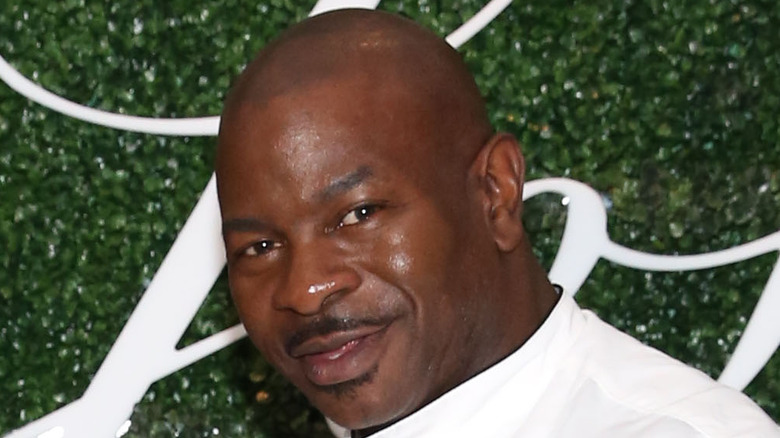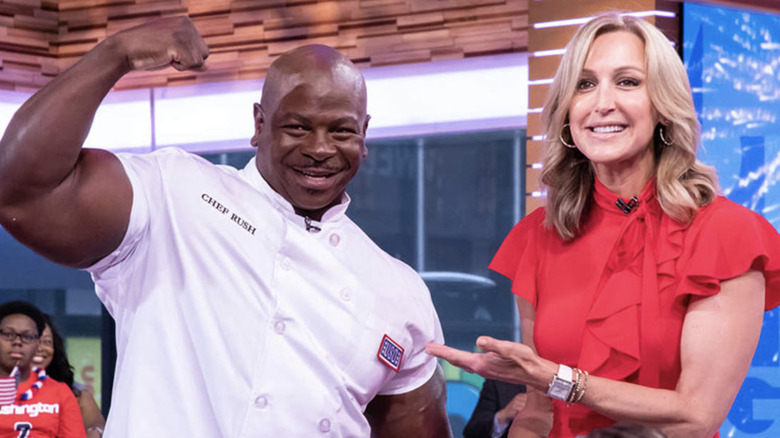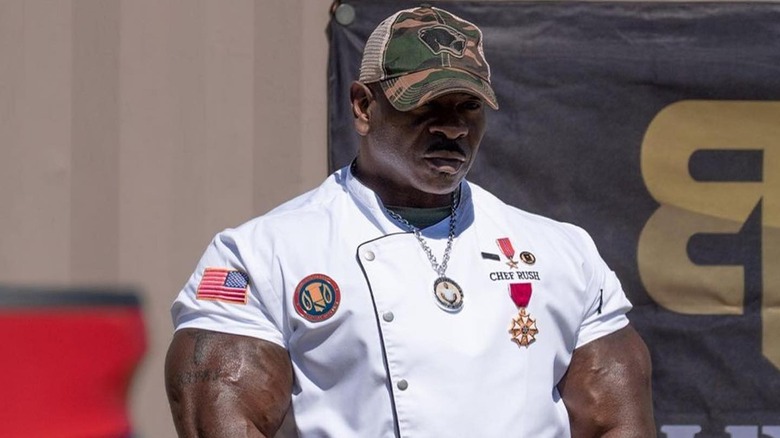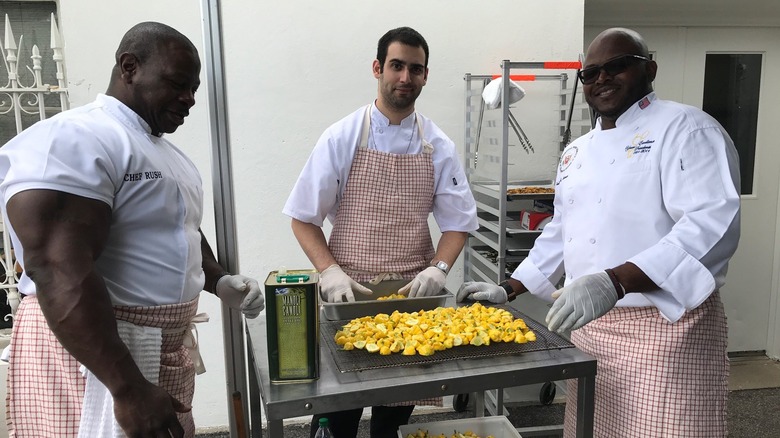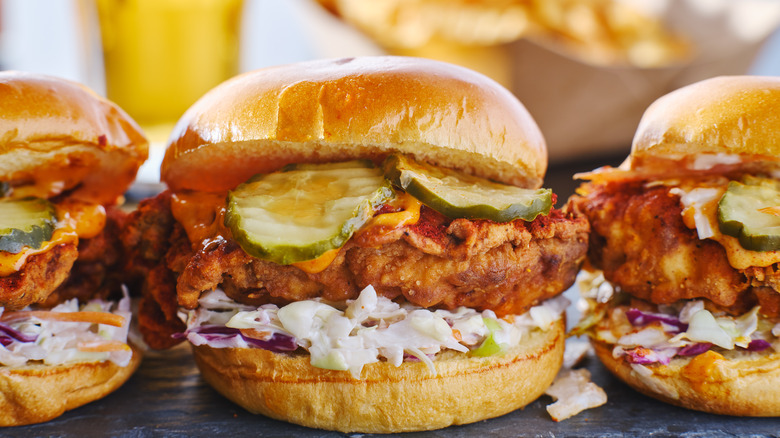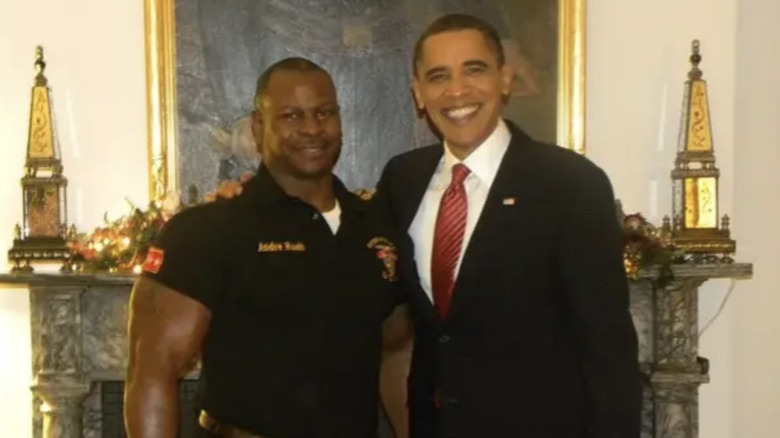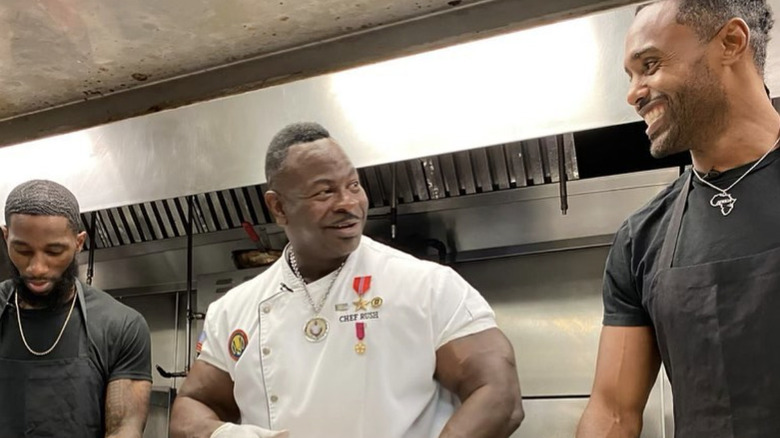Chef Andre Rush Reveals What It Was Really Like Working At The White House - Exclusive Interview
We may receive a commission on purchases made from links.
Chef Andre Rush has attracted national attention, but it's not just for his skills in the kitchen. The talented cook is known for his massive 24-inch biceps that make him look more like he's a part of the CIA, than a man that makes meals behind the scenes. However, Rush doesn't put together decadent dinners for just anyone. He worked as a chef for the White House for nearly 20 years serving under Bill Clinton, George W. Bush, Barack Obama, and Donald Trump.
The Mississippi native was also part of the U.S. Army and served as a combat veteran in Iraq. In an exclusive interview with Mashed, Rush revealed that his new memoir "Call Me Chef, Dammit!" gives an extremely raw and telling story of life. The Bronze Star Medal recipient detailed what it was like to be at the Pentagon on 9/11 and how he navigates the PTSD that was caused from it. He also told us what it was really like to work at the White House and what meal each commander-in-chief couldn't live without.
How Andre Rush's childhood influenced his cooking style and why he joined the U.S. Army
How did growing up in Mississippi influence the kinds of food you create?
It was funny because, in Mississippi, it was all Southern food, comfort food. I mean, I think the closest thing we had was home ec, but I wasn't in home ec of course. I did notice, and I felt the love that cooking gave when I was with my mother, or my families, or people from the church, people from other neighborhoods, how we gathered, whether it be a barbecue or a Southern meal, especially for Thanksgivings, and Christmases, and things like that. As a young kid, it was so ... just embedded in my mind, and my heart, and my head about how food was supposed to be to me, and how I thought it was.
When I joined the military and did all those other things, they weren't all the same. That's when I realized all food is not created equal. I mean, you think about demographics, where you're from, Southern food, Italian food, Asian food, New York food, LA food here, all of it's so very different. I can go very fancy, but I try to capture, regardless if I'm doing extremely fancy or extremely simple, I'm trying to capture the heart, that passion. When you eat the food, you want to say, "Okay, this chef, he put love into this. This has a story behind it."
What inspired you to join the U.S. Army and how did that time shape your cooking career?
That's an easy one. My whole entire family was [about] servitude. My younger sister, she's a Lieutenant Colonel in the Air Force. It was eight of us, so the next one up from me is 13 years older. They were already older, mature teenagers. My other brother, he was a Merchant Marine. I had another brother who retired as an officer in the Navy. Then I had one of my sisters, she was in special education. Then she became a counselor for kids. One of my other sisters, she helped the blind live in communities.
I had a lot of opportunities from track scholarship, football scholarships, going to the Olympics, arts scholarship, but I chose to go into the military just because I felt that need to go. The military, along with my background growing up in Mississippi was the leadership skills. I was put in leadership skills very young, very early on. Well, actually the first day I got into the military, I was put into a leadership position, unbeknownst to myself because in Mississippi there was only black and white. Now I'm in this rainbow of colors, and people, and demographics. I had to be very ambidextrous, inside, outside of the box, meaning that I had to be able to look through the window, and I also had to be person on the other side of the window, and have eyes on each side.
The impact of 9/11 on Andre Rush
In your new book, "Call Me Chef, Dammit!," you write about being at the Pentagon on 9/11. How has that day impacted you?
Like me, it changed the world. Nothing as we know it is the same since that day. Everything literally changed, and the world of complacency and thinking that we're safe was over. It's over. Because of what happened to me personally ... I have PTSD. I say that openly. People say "had." I think there's no such thing as "had." It's not that simple.
People ask me how I stay grounded, how I cope. One of the things that I learned to do was to use people as my coping tools. You have your triggers, which people are my triggers as well because on social media, you get a lot of trolls and people that can't do what you do. They feel comfortable by grouping up and just attacking. That's human nature. The only part about that is it happens a lot with the kids, so I have to try and combat that. I do combat that, but for me, that was the start of a journey that I didn't know I was supposed to take. That's actually part of the journey of why I'm here right now as Chef Rush.
I used cooking to mask a lot of that when I started. I knew very early on that [something] was going on with me when that happened. When it was offered then, "Do you want help? Go to your leadership," I did that. My leadership, because I was in a very high position, back then things were different. ... The suicides, all that, it was a stigma that came along with it, so that ideation and all those things [of] you're not a man, you're not a soldier, or you're not a she-woman, or whoever, it was shunned upon secretly, not openly.
I had lost friends there as well in the Pentagon, and when I asked the question, the only response back was, "Do you like your job?" My response was, "roger," and walk away. That means deal with it. If you go down this road, you won't be here anymore. That's unfortunate. Now, today it's not like that. In some situations it is, but it was a journey that I had to take. It was needed. If I hadn't taken that journey, the hard road ... I would not have had it any other way. I would not want it to be given or anything of the sort, so I took it for that value, face value. I did what I had to do as long as I could.
Chef Andre Rush dishes on what it was like to cook in the White House
What was it like when you made your transition to working at the White House?
I loved everything about it. I loved the whole environment, just being a part of history. I'm a history person. I've been in places from West Point, the academy, which is historical from 1820 ... I love history, and how things, and what things were when, and why, and all those different things.
The one thing that people ask me about was how was it when I went there, the first time I ever went inside as a young kid, I'm going inside the White House. You would think I'm like, "Oh my god, this is the White House," but because of the way I was taught and because of what my dad embedded in me about my work ethics, I didn't look to the left, I didn't look to the right. I looked to what's my job, and I have to do it the best that I possibly could be because of my mentality. And I'll be very frank with you ... [if] there's someone that's going to try to stop me from succeeding. There's someone, something... It was just me. Not saying that it really was but my mindset is that I have to prove myself each and every day, never become complacent, I'm still the hardest worker in the world, and I have to do a reset every day.
Every day is my first day is my motto. That's how people become complacent, whether it be jobs, relationships, anything, but especially the cooking realm of it because there's so much competition, especially now. ... In my job, you are never to be seen. I was a big guy. I was always seen, so I always tried to hide out because a lot of people used to come to me and be like, "Hey, what is that guy that weighs 300 pounds with 24-inch biceps doing in a chef's coat?" I'd go, "Well, you know," and then run by. You catch attention a lot, and that is not what I wanted to do until I had to do it.
Chef Andre Rush said this was Bill Clinton's favorite comfort food
You worked during Bill Clinton's administration, did he have comfort foods that he liked to eat at the end of a long day?
It's whatever she wanted him to eat. A lot of people don't understand that FLOTUS controls the flow of everything that goes in. This is 99% of administration. FLOTUS is the person that actually hires the chefs. She can also fire the chef, and that's the relationship part of it. She also dictates the menus. [For] Bill Clinton, a great fried chicken sandwich was always on a comfort part of the zone. She had other ideas. That was a touchy slope. He may order one thing and get something else.
What about George Bush, were there any food items that he hated to have on the dinner table or just wasn't interested in?
I wouldn't use the word hated, besides his dad, he banned all vegetables from the White House, and he banned broccoli. He hated broccoli. He was the one where it was old-school Texan like, "Nope, not having it ... I'm not having it, so nobody else is going to have it either," which is pretty funny because it's usually never like that. He's very old school, unlike his son. He was very open. Like I said, he loved that Texan type of flair that goes along with it. He ran every day, so he was also a health nut.
Barack Obama's favorite dessert and what Donald Trump ate (or didn't eat) in the morning, according to Andre Rush
What was Barack and Michelle Obama's go-to dessert or junk food item?
Well, they were crazy about the red velvet cake. ... He would have his little candies hidden around. When I think junk food, I think that's probably the extent of it — loved burgers, loved some pizza. He had his famous chili that he did all the time or that we did ... She implemented the garden back into the White House ... which was absolutely amazing because I'm not a vegan, but I love cooking vegetables. I can make a 10-course vegetarian meal easily because you can do so much more with them ... The flavor profile you can play with and aromatize. I love that about them. As far as the junk, it wasn't a lot of junk really. I can't even contest it besides some M&M's.
Was there anything Donald Trump liked to eat in the morning or start off his day with?
Geez, did he even eat in the morning? Some people are not morning eaters. He's a worker. He's up all night. It wasn't a lot of morning breakfast. Actually, all of them, it was very different in comparison. Food wasn't a high priority, when I say that, I mean on the administration side of it — on that administration side of it for his term. Nothing's wrong with that if you know what he ate and how he ate during the day, which has been all over from the burgers to everything overcooked or taco salads. ... I would have to say burgers would be the number one if I had to put [it] into perspective, as he'd call it the American food.
What was the strangest food request you were asked to make while at the White House?
Me personally, I didn't have a strange food request. I know some of the guys have had some type of strange requests in the past ... [like] a rhubarb and peanut butter sandwich. I guess it's a play on, I don't know if you remember, where people used to have celery and peanut butter. ... I have no idea where it came from, but it was rhubarb and peanut butter.
Andre Rush reveals new details about his food line and television show in the works
We heard that you're working on a new brand that's going to include a food delivery service. Can you tell us more about that?
I'm working on that right now. ... What happened was during the pandemic, everything went [to] deliverables, deliverables as far as those boxes of food that go out to everyone. I have a lot of friends who have great ones. A lot of them, they missed the mark because a lot of them were sodium driven, a lot of them were tasteless, a lot of them, they didn't keep, however. I got my guys on the team, and we put together foods that taste ... very good, flavorful, aromatic, and also they're the lowest in the market by a long shot. They're healthy.
Anything that was put on there, I actually had to personally approve myself whether it be the taste profile, the looks. ... Is it too much sauce in it? Is it this? Is it that? I know everyone's into counting macros, and counting this, and counting that, but a lot of people are forgetting just the basics, and that's themselves to understand. I got to count my macros which is great and doing all the things they do, but are they managing themselves the right way?
We read that you're going to host a new series called "Chef and the City." Can you tell us a little bit about what that show will involve?
Actually, "Chef and the City," that one is actually on hold, but what I will tell you is that I am doing another. I'm actually signed with Gordon Ramsay and part of his team to create my own show. I decided to do that one over "Chef and the City" because "Chef and the City" was one of the early ones where I didn't have free reign. On this one ... I'm part of the creative part of it. I can say what I want to do [and] how I want to do it.
They're extremely open to, "Hey chef, what do you want to do?" It's always, "You have the military, you have the kids, you have this, have that, have family, have spouses, something fun." I like to have fun. If you see my stuff, I love to make fun of myself. I love to make fun of other things. I love to be very adventurous. I could jump out of a plane, and into some water, and eat some grass, and keep on going. That's what I've always done.
Then I'm also doing something with the Food Network right now. I start filming at the end of this month, but that's something later down the line. I also have another one that's going to be extremely big, but I can't say anything about it. This person who actually is driving it is a huge name in the industry, and I was very humbled. I co-wrote the show, co-created the show with one of the writers here in LA. It's just a comical show. It's just hilarious actually. A lot of it's actually true, but it's switched a little bit. It's going to be fun. ... It's actually going to be on Prime.
That's exciting. It sounds like you have a lot of interesting projects in the works.
They'll be exciting. Like I said, [it's nice] to do things like this and to have fun with what you love. Cooking is so many different things. It's not only nutrition. It's life, it's mental health, it's together, it's relationships, it's loving, it's family, it's holistic.
Be sure to pick up Andre Rush's new memoir "Call Me Chef, Dammit!: A Veteran's Journey from the Rural South to the White House," or book him for a motivational speaking engagement.
If you or someone you know is having suicidal thoughts, please call the National Suicide Prevention Lifeline at 1-800-273-TALK (8255) or text HOME to the Crisis Text Line at 741741.
